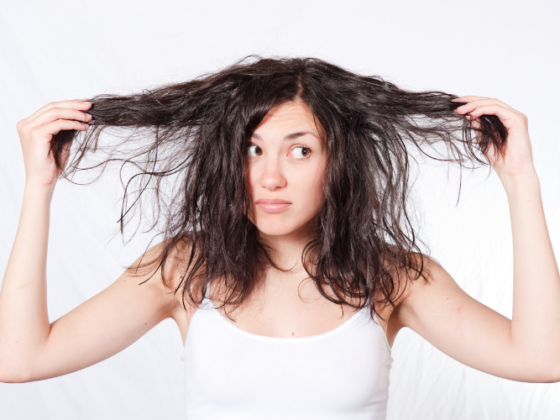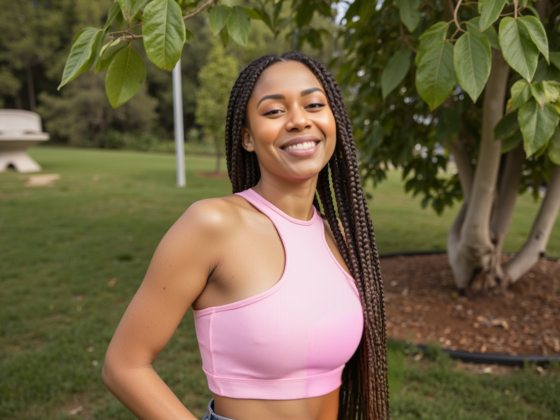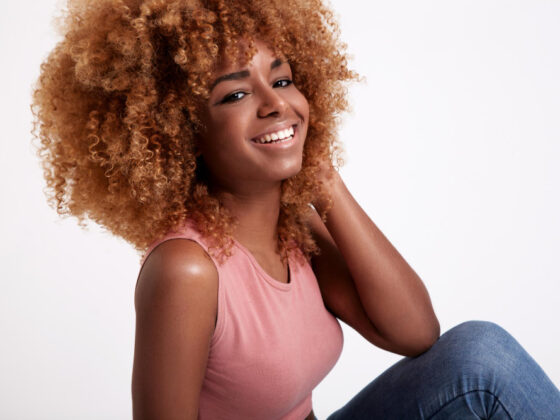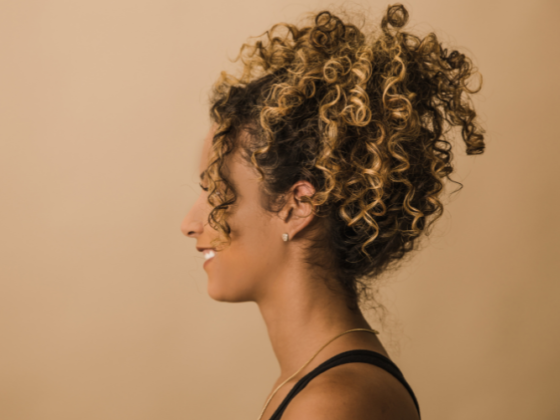First of all, congratulations.
You’ve gone through something very hard and it’s not easy – giving birth means that your body has undergone many physical changes during this time.
You’ve just delivered and your body is still healing.
As your body adjusts to post-pregnancy hormonal fluctuations, your body and hair will undergo many changes.
I’ll explain this in a bit – but this post is going to cover what you need to do to protect your hair and care for your hair.
I’ll also guide you on when and how you can safely start washing your hair again.
I’ll cover why people say it’s against their cultural beliefs to wash hair right after delivery – and as a new mom, I know you’re eager to wash your hair and clean yourself asap.
I get it.
So let’s understand more about this.
This post contains affiliate links, meaning I may make a commission at no extra cost to you if you decide to click on a link and purchase something. Click here to read the full disclaimer.
What happens to hair after giving birth? Do women experience hair fall after giving birth?

Now, you need to understand that the hair growth cycle consists of 3 main stages, known as Anagen, Catagen, and Telogen phases.
- Anagen Phase: In this stage, the hair is in the active growth phase – so cells in the hair follicles divide rapidly and hair strands grow from the root.
- Catagen Phase: This is a short transitional stage that follows the anagen phase and during this hair stage, hair growth stops and the hair follicle shrinks – this can last 2-3 weeks.
- Telogen Phase: This is the resting phase of the hair growth cycle, when the hair is in the telogen phase, a new hair begins to form underneath it, preparing to push out the old hair.
Now, keeping this in mind, let me explain what happens to hair after childbirth.
It’s very common for women to experience considerable hair loss after giving birth.
So, don’t panic if you’re seeing hair fall out in clumps.
This hair loss is known as postpartum hair shedding or telogen effluvium. Basically, your hair is now in the Telogen phase.
During pregnancy, hormonal changes caused a reduction in hair shedding, and this meant you had thicker and fuller hair – your hair was in the Anagen phase.
It’s completely hormonal and totally normal.
You’ll even notice your skin had that warm glow – they call that the pregnancy glow.
However, after childbirth, hormonal levels return to normal – and the hair that was in the resting phase during pregnancy enters the shedding phase.
So, you’re going to get back all the hair you’re losing – it’s just a phase.
Why is it common practice to not wash hair after delivery?

You have to understand that cultural beliefs were very strong back in the day – it’s still passed on.
And in some regions of Asia (especially India and China), there is a belief that women should avoid washing their hair for a certain period of time after giving birth.
There is no scientific evidence, but they believe that washing hair immediately after childbirth can expose the mother to cold temperatures which can lead to health issues like a cold or pneumonia.
They believed that the pores are open after delivery and water and cold can get into the pores making the mother ill.
Yes, a woman does have to take care of her health after childbirth because her body has just gone through a lot of physical stress and now has to heal.
But it’s very important to also stay hygienic and clean after delivery because new mothers are vulnerable to germs and infections – so cleaning your hair is important!
This brings me to my next point…
When can I wash my hair after giving birth?

You can wash your hair safely anytime after giving birth – there is no hard and fast rule that you need to wait to wash your hair.
But you can take some precautions to do it safely.
1. Be very gentle with your hair

Use warm water (not hot or cold) and gently massage a mild shampoo into your hair. You can also use baby shampoo. Rinse it thoroughly with warm water to clean your hair.
You can use the Pura D’Or Anti-thinning natural shampoo.
It’s best to use natural shampoos with a lot of healthy ingredients because these aren’t harsh to the hair and they’re organic.
Don’t use harsh shampoos.
Your hair is in the telogen phase – so it will be shedding and you will experience some hair fall – don’t get worried.
2. Dry your hair almost immediately
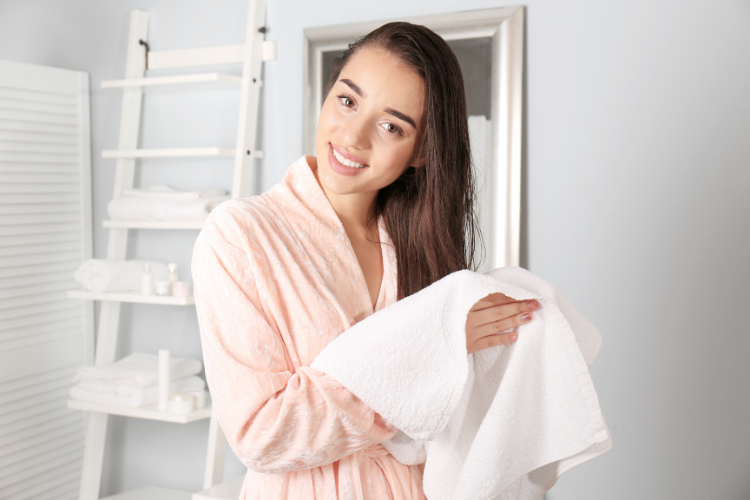
Use a microfiber towel and gently pat dry your hair – don’t rub or pull. Remember, your hair is in a delicate stage.
Just be kind to your hair.
Drying your hair after washing it immediately will help you not expose your hair or scalp to cold air because this will make you susceptible to a cold.
3. Don’t expose your wet hair to cold air or AC
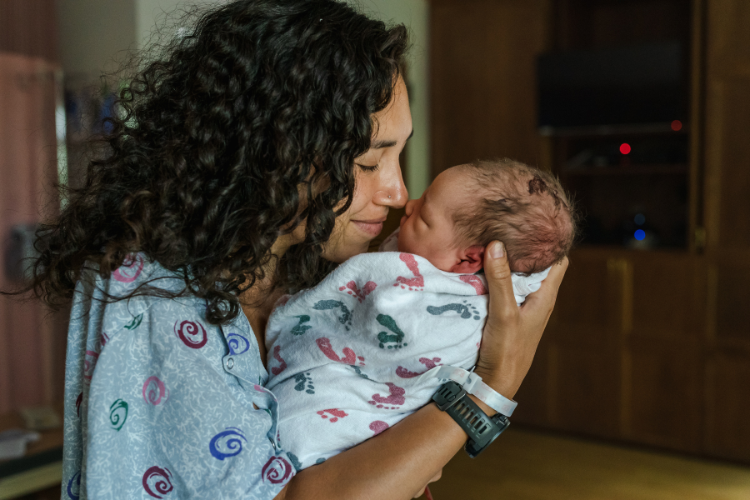
Just avoid sitting in direct AC after washing your hair – dry it as soon as you can – this will ensure that you do not catch a cold.
If you live in warmer climates – then there is nothing to worry about. You’re all good.
So as long as you wash your hair gently with warm water and use a mild shampoo
How to take care of hair after pregnancy?

Okay, so we’ve covered why cleaning your hair after pregnancy is important and I’ve even discussed how you can clean your hair gently.
Now, it’s also important to maintain good hair health and promote healthy hair regrowth.
Yes, postpartum hairloss is kinda freaky – but you’ll get back your hair, don’t worry.
Here are some tips for caring for your hair during this time:
1. Eat a healthy and balanced diet

Your body needs to heal and your hair needs a lot of nourishment from the inside.
A nutritious diet rich in vitamins, minerals, and proteins will contribute tremendously to hair health.
So, make sure you include foods like fruits, vegetables, whole grains, lean proteins, and healthy fats in your meals.
2. Stay hydrated
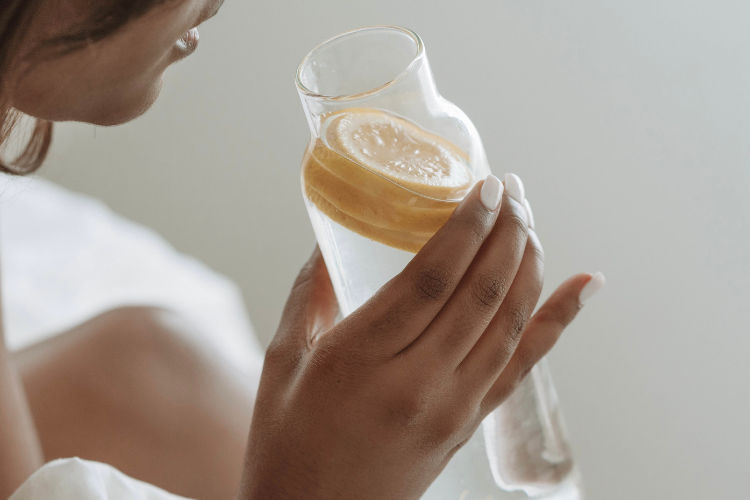
You need to drink water – a lot of it!
Drinking water is essential for your overall health but it’s also going to help keep your hair hydrated and soft too.
Aim to drink enough water throughout the day.
3. Continue your gentle hair routine

Don’t tug at your hair, or comb through it harshly – detangle your hair in the shower with a lot of conditioner if you have knots and tangles.
Use mild shampoo. I only recommend this Pura D’Or Shampoo and conditioner combo.
Avoid excess rubbing or vigorous towel-drying – this will cause additional hair breakage.
Please be gentle with your hair when combing or brushing – use a wide-toothed comb to be on the safe side.
4. Minimize or stop heat styling

I would recommend completely stopping the use of heat styling tools like flat irons, curling irons, blow dryers, etc because excessive heat will damage your hair.
If you have to use heat, keep it to a minimum.
Use the cold air setting on the blow dryer or diffuse your hair.
Similarly, please avoid chemical treatments like perming, relaxing or coloring – because these processes will weaken the hair further.
5. Avoid tight hairstyles

Your hair is very delicate at this stage.
So, I recommend avoiding hairstyles that pull tightly on the hair (like tight buns or ponytails) because they can contribute to hair breakage.
Opt for looser hairstyles, like a pineapple (use satin scrunchies, I can’t get enough of them) or a loose ponytail.
6. Take supplements

I highly recommend checking with your doctor first but you can try taking supplements that support hair health like biotin, vitamins D and E, and omega-3 fatty acids.
Please consult with your doctor because they can provide guidance based on your needs.
7. Manage your stress
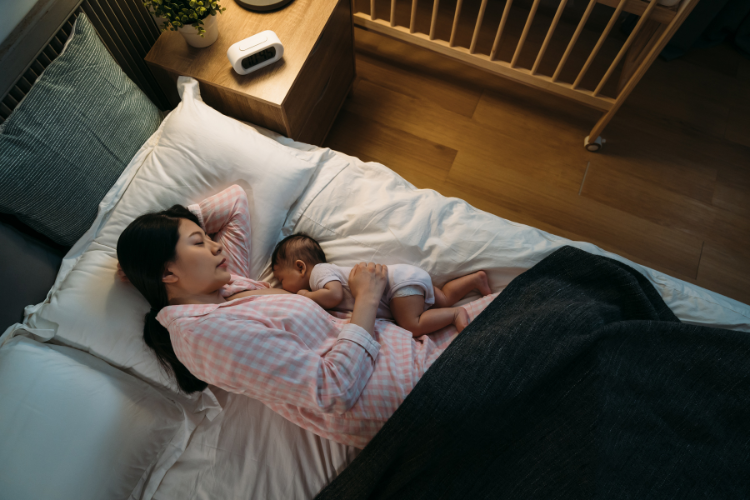
It’s by far the most important tip – I know being a new mother is incredibly stressful, but try to take care of yourself as much as you can.
Find healthy ways to cope with stress like exercise, meditation, or engaging in hobbies you enjoy.
My mom read a lot even after pregnancy – she tried to read whenever she got free time and she told me it really calmed her down.
Remember, postpartum hair loss is a temporary phase.
Your hair will likely return to its normal growth pattern within a year.
However, if you have concerns about excessive hair loss or any other hair-related issues, please check with your healthcare professional or consult a dermatologist for personalized advice and appropriate treatment if needed.
Here are some more posts to help you:



